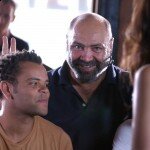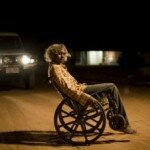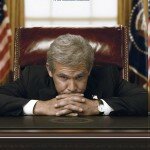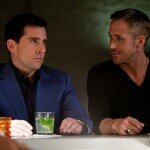Charlie and Eddie go to White Castle in Richard J. Frankland’s Stone Bros., but are discriminated against once they arrive. Why? Because they’re indigenous Australians, and while they have a lot in common with the hilarious pot-smoking duo Harold and Kumar, the ‘White Castle’ in question is not a burger joint. Or if it were, Mc Reconciliation burgers would be in short supply.
It’s not something you’ll hear very often, but Stone Bros. is what you’d call a culturally and politically important stoner comedy. Written and directed by Frankland, a proud member of the Gunditjmara tribe, it’s the first ever Aboriginal comedy to come out of Australia. The film still deals with topical themes such as racial discrimination and reconciliation (how could it not), but what sets it apart from other indigenous films is that it has the balls to laugh about them.
Ironically, the catalyst for all the events in Stone Bros. is former Australian Prime Minister John Howard. Or at least a portrait of him hung inside a Perth Museum, where Eddie (Luke Carroll) works as a cleaner. He loses his job when his loud-mouthed, pot -smoking cousin Charlie (newcomer Leon Burchill) makes a surprise visit and accidently knocks over Howard’s portrait onto the museum owner’s cat. It’s the last straw for Eddie, who decides it’s time to leave the big smoke and head home to Kalgoorlie to reconnect with his Indigenous heritage by returning a sacred stone. Charlie, armed with 187 joints of marijuana, insists on coming along for the ride, if not only to escape his nagging girlfriend. Engulfed in a cloud of their own smoke, the duo bump into an assortment of wacky characters on the way, including a hitchhiking Italian-stallion named Vinnie (Valentino del Toro), their cross-dressing cousin Regie/Regina (David Page) and a confused Caucasian cop (Peter Phelps) who dreams of going walkabout.
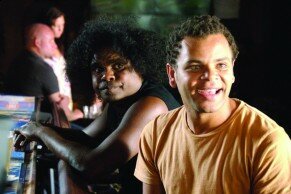
|
While it’s hard to look past the scripted nature of the characters, the likeable dynamic of the two protagonists keeps us in tune; Carroll’s subtle wit fairs well against Burchill’s matchless energy, however excessive it is. Most of the comedy derives from random slapstickery separate to the main message, such as Eddie’s hilariously woeful attempt at reversing up the road while stoned. On the flip-side however, an encounter with demonic pooch greatly overstays its welcome and a bizarre outback wedding spoilt by a crazed demolitionist completely bombs. But when humour and meaning do merge, Stone Bros. shines; in one wacky dream sequence where Eddie is creepily doted on by white folk, social hierarchy is flipped on its head to both comical and political effect. It’s these inspired scenes that help overshadow the clunky dialogue and hit-and-miss wit of Frankland’s screenplay.
Whereas Warwick Thornton’s Samson and Delilah did well to draw in the festival and art house crowds, Stone Bros. is likely to attract a teenage audience with its below-the-belt humor and up-beat soundtrack (featuring the eclectic sounds of ‘John Butler Trio’). It’s a smart way to furtively educate a demographic largely ignorant to the plight of Aboriginal Australians, not to mention a refreshing break from the slew of depressive films to come out of our film industry of late. It won’t burst through the comedic stratosphere, but Stone Bros. is still a trip worth taking.
 Follow the author Anders Wotzke on Twitter.
Follow the author Anders Wotzke on Twitter.



